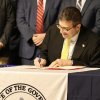The statistics are overwhelming. The vast majority of our high school students are unprepared for life in a skill so vital to their success: financial literacy.
We know understanding the basics and even some of the not-so-basics of financial literacy can propel them to reach their full potential, while denying them the opportunity to learn how to understand and manage their finances may doom them to a life that is always an uphill journey.
Did you know:
- 60% of U.S. households live paycheck to paycheck (Forbes)
- Average credit card debt is greater than $6,200 (Lendingtree.com)
- Nearly 40% of Americans have less than $300 in savings? (USA Facts)
- 28% of our citizens have total assets less than $25,000 (USA Facts)
- 42% of Hispanic Americans and 41% of African Americans have saved less than $25,000 for retirement (USA Facts)
- 33% of all Americans have not saved anything for retirement, 95% have not saved enough (yourfinancialedu.com).
Seventeen states have addressed this inequity through mandated legislation requiring one semester of a standalone personal finance course to graduate high school, with Florida, Michigan, Kansas and New Hampshire being the most recent. A solid understanding of personal money management is the great equalizer. Possessing that knowledge enables someone earning $50,000 per year to achieve a $1 million-plus net worth, and not having that knowledge often prevents someone earning $100,000 per year from achieving the same. Over the course of our careers, we have seen countless people struggle with the consequences of excess debt and money mismanagement often caused by the lack of a structured financial education. “I wish I had learned this in high school, college or before I was thousands of dollars in debt” is a recurring theme we hear all too often. To remove any doubt of the importance of financial literacy, open your preferred browser and search “Ronald Read janitor.”
The irony is that we are taught the foundation of personal finance at an early age when learning addition, subtraction, multiplication and division. What is missing and what our education system needs to do is teach all students how to apply these basic math skills to personal finance. While less than 15% of high school students will use algebra in their careers, 99% of high school students will need to manage their personal finances in adulthood. We are not suggesting the deemphasis of advanced mathematics; rather we are advocating for the teaching of personal finance to all high school students. Take the age-old problem: “A train leaves Chicago traveling west at 60 mph. An hour later, another train leaves traveling east at 80 mph. When are ...” and ask yourself which is more important in life: solving for x or knowing the cost of the ticket before you purchase it, how many hours you must work to pay for the ticket and if you charge the ticket and don’t pay your credit card bill in full, understanding the real cost of that $100 ticket could easily surpass $125. As an adult, knowing what you know now, is there any question as to the importance of personal money management in your everyday life?
The time for action is now. Delaying and keeping a curtain over this knowledge stunts personal growth, reduces lifelong income, stunts the desire for entrepreneurship and the ability to make choices based on the reality of what the financial numbers tell us. Although much work has been accomplished by a 2018 Legislative Task Force, the implementation of the recommendations has not been as widespread as anticipated. Many high schools offer a standalone financial literacy skills course, but many do not. It probably does not surprise us that in many underserved communities, financial literacy is not offered. It is time to level the playing field for all students, not just selected students. We propose through legislation a semester-long standalone financial literacy course as a graduation requirement for all students in every high school in Delaware.
Join with us! Call/email your state representative and senator. Email the governor. Let them know we can no longer deny this education to our nation’s next generation of leaders.




















































